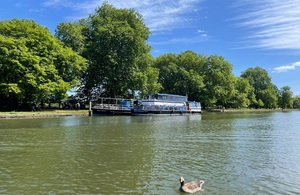Environment Agency and partners warn Berkshire river users to stay safe in heatwave
People warned that hazards around bridges and locks, dangerous flows and unexpectedly cold water can catch bathers off guard.

Rivers are great places to have fun and get close to nature, but vigilance can save lives and water-related accidents can be avoided by knowing how to stay safe.
With a heatwave across England the Environment Agency, Berkshire Fire and Rescue and Maidenhead Council are reminding people not to take unnecessary risks while trying to cool off, and to always make sure family and friends stay safe.
Water can contain hazards, particularly in and around structures such as bridges, locks and flood channels, as well as dangerous flows after rain and thunderstorms. Unexpectedly cold waters or strong currents can also catch bathers off guard.
Rivers are great places to have fun, get close to nature and spend time with friends and family, but vigilance can save lives and water-related accidents can be avoided by knowing how to stay safe.
Russell Robson, Waterways team leader for the Environment Agency, said:
The summer is always a busy time on our rivers, and we expect the River Thames to be a focal point for a lot of people’s leisure time. We are urging parents to supervise their children closely in and around water and make sure they do not go into the water alone. Take any warning or safety signs seriously, stick to proper pathways, look out for trip or slip hazards around water, and stay a safe distance from the edge of river banks and cliff edges.
Neil Whiteman, Safety Education Co-ordinator at Berkshire Fire and Rescue, said:
Over the last year, we have massively stepped up our work with local authorities and the Environment Agency to improve safety along Berkshire’s waterways. The main thing to be aware of when entering the water is cold water shock which can catch even the best swimmers off guard. It’s also important to note that, when jumping into water, you may not see what’s hidden below. Shopping trollies, scrap metal and wooden splinters are just a few items that could cause serious injury or trap you under the water.
Councillor David Cannon, Cabinet member for Anti-Social Behaviour, Crime, and Public Protection, said:
We want people to stay safe around water and understand the risks. Over the last year, our Community Wardens have worked with landowners and our partners to install additional safety and warning signs at key locations along the river. In readiness for summer, the wardens have checked buoyancy aids and are stepping up their patrols along stretches of the river in order to continue those checks and speak with people about water safety.
The key safety points are:
-
If you get into trouble in the water, Float to Live – more at www.rnli.org
-
Lean back and use your arms and legs to help you float, then get control of your breathing before calling for help or swimming to safety.
-
If you see someone else in trouble in the water, call 999 or 112. If you are at the coast ask for the coastguard, if you are inland, ask for the fire service.
Further information
Top water safety tips
Don’t jump or dive in as the depth may vary and there can be unseen hazards.
Don’t go in near weirs, locks, pipes and sluices. These and some other water features are often linked with strong currents.
Inland waters can be very cold no matter how warm the weather. Those going into cold water can get cramp and experience breathing difficulties very quickly.
Most importantly, parents and guardians can help keep children in their care safe by:
- Teaching them to swim
- Warning them not to go into water alone, or unsupervised
- Ensuring they know where the children are and what they are doing
- Supervising them closely when near any open water
Remember, drowning can occur very quickly even in shallow water and the key to keeping safe is to take all necessary precautions to avoid getting into difficulty in the first place.
Find out more about water safety.